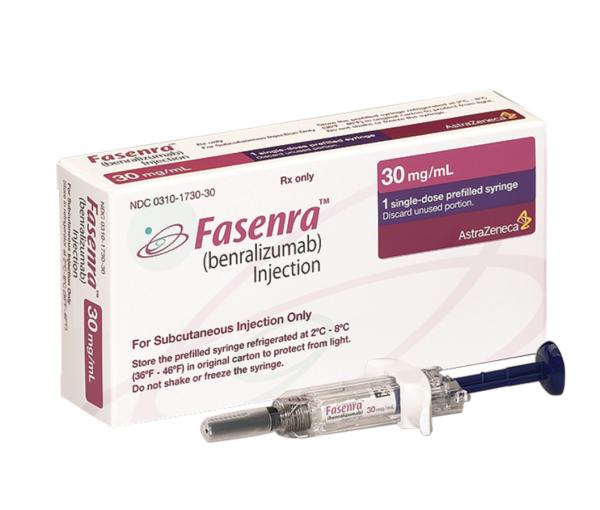Fasenra Side Effects
Generic name: benralizumab
Note: This document provides detailed information about Fasenra Side Effects associated with benralizumab. Some dosage forms listed on this page may not apply specifically to the brand name Fasenra.
Applies to benralizumab: subcutaneous solution.
Common side effects of Fasenra
Some side effects of benralizumab may occur that usually do not need medical attention. These side effects may go away during treatment as your body adjusts to the medicine. Also, your health care professional may be able to tell you about ways to prevent or reduce some of these side effects.
Check with your health care professional if any of the following side effects continue or are bothersome or if you have any questions about them:
More common side effects
Less common side effects
- bleeding, blistering, burning, coldness, discoloration of the skin, feeling of pressure, hives, infection, inflammation, itching, lumps, numbness, pain, rash, redness, scarring, soreness, stinging, swelling, tenderness, tingling, ulceration, or warmth at the injection site
- body aches or pain
- congestion
- dryness or soreness of the throat
- runny nose
- tender, swollen glands in the neck
- voice changes
Serious side effects of Fasenra
Along with its needed effects, benralizumab (the active ingredient contained in Fasenra) may cause some unwanted effects. Although not all of these side effects may occur, if they do occur they may need medical attention.
Check with your doctor immediately if any of the following side effects occur while taking benralizumab:
Less common side effects
- fast heartbeat
- fever
- hives, itching, or skin rash
- hoarseness
- irritation
- joint pain, stiffness, or swelling
- redness of the skin
- swelling of the eyelids, face, lips, hands, or feet
- tightness in the chest
- troubled breathing or swallowing
Incidence not known
- cough
- dizziness
- puffiness or swelling of the eyelids or around the eyes, face, lips, or tongue
- unusual tiredness or weakness
For healthcare professionals
Applies to benralizumab: subcutaneous solution.
Hypersensitivity adverse events
- Frequency not reported: Anaphylaxis, angioedema[Ref]
Immunologic
- Frequency not reported: Immunogenicity[Ref]
Local
Respiratory
- Common (1% to 10%): Pharyngitis (bacterial, viral, or streptococcal), cough[Ref]
Other
- Common (1% to 10%): Pyrexia[Ref]
Nervous system
- Common (1% to 10%): Headache[Ref]
Dermatologic
References
1. (2017) "Product Information. Fasenra (benralizumab)." Astra-Zeneca Pharmaceuticals
Frequently asked questions
- What are monoclonal antibodies?
- Does Fasenra weaken your immune system?
- How long does Fasenra take to work?
- What is Fasenra used for and how does it work?
- What eosinophil count is needed for Fasenra?
- What type of asthma is Fasenra used to treat?
More about Fasenra (benralizumab)
- Check interactions
- Compare alternatives
- Reviews (76)
- Drug images
- Dosage information
- Patient tips
- During pregnancy
- FDA approval history
- Drug class: interleukin inhibitors
- Breastfeeding
Patient resources
Professional resources
Related treatment guides
Further information
Fasenra side effects can vary depending on the individual. Always consult your healthcare provider to ensure the information displayed on this page applies to your personal circumstances.
Note: Medication side effects may be underreported. If you are experiencing side effects that are not listed, submit a report to the FDA by following this guide.

